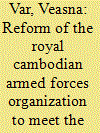| Srl | Item |
| 1 |
ID:
151995


|
|
|
|
|
| Summary/Abstract |
This article analyses two security challenges facing the Royal Cambodian Government (RGC) and the Cambodian Defence Organization at the strategic level for the next decade. The first obvious challenge relates to the stalemated territorial dispute along the Cambodia–Thailand border, particularly the question of ownership of the Preah Vihear (called PhraViharn in Thailand) temple and its surrounding area since October 2008. Bilateral talks to manage the crisis and dispute failed, and the same happened to mediation and peacekeeping efforts by the Association of Southeast Asian Nations (ASEAN) in general and Indonesia in particular. This is considered to be a top security challenge for Cambodia’s national security and drives the military forces’ capability adjustment. The second challenge arises from the overlapping maritime boundary dispute with Thailand in an area which is believed to contain significant oil and natural gas reserves. The article will focus on the nature of the current border conflict with Thailand and its implications for the Cambodian Defence Organization given its limited budget and capability. This article argues that these two key security factors have significantly underpinned Cambodia’s strategic environment and have greatly impacted upon and shaped Cambodia’s reform agenda, defence posture and international engagements. It is also argued the conflict severely tested the regional organization ASEAN and Indonesia as its Chair.
|
|
|
|
|
|
|
|
|
|
|
|
|
|
|
|
| 2 |
ID:
145486


|
|
|
|
|
| Summary/Abstract |
Cambodia has recently recovered from decades of civil conflict, and remains one of the poorest countries in the region. The current political stability and peace in Cambodia has provided great opportunities for the Royal Government of Cambodia (RGC) to focus on national reconstruction and economic development. The Royal Cambodian Armed Forces (RCAF) is currently at a major crossroads with respect to reforming its forces, which contributes to the government’s grand strategy called the “Rectangular Strategy.” This strategy lists reform of the RCAF as one of the outcomes needed to achieve national strategic objectives. It states that the RGC is strongly committed to military reform with a goal of rebuilding the armed forces to an appropriate size and quality to be able to defend the country in wartime and peacetime. Although the RCAF has achieved its missions very satisfactorily, it faces significant challenges with respect to its reform programs. The purpose of this paper is to identify the major military reform challenges confronting the RCAF and examine the current policy being pursued by the RGC, and then it will propose policy framework options to address a range of current and increasing problems and challenges to RCAF reform.
|
|
|
|
|
|
|
|
|
|
|
|
|
|
|
|
| 3 |
ID:
153512


|
|
|
|
|
| Summary/Abstract |
This paper will assess Cambodia’s current and future strategic and security
situation, arguing that current and future Cambodian national security will be
determined by the three key strategic security issues of domestic, geographic,
human and economic security. These three key security factors have significantly
underpinned Cambodia’s strategic challenges. The first strategic challenge is related
to the current domestic political deadlock between the two major political parties,
the ruling Cambodian People’s Party (CPP), led by Prime Minister Hun and the
opposition Cambodia National Rescue Party (CNRP), led by Sam Rainsy. The
current political contestation has significant challenges for Cambodian national
development as well as foreign policy. The second major strategic challenge
for Cambodia relates to economic security, and the requirement to balance the
strategic competition between China and the United States to gain influence within
Cambodia. This external power competition has a significant impact on Cambodia’s
political and economic circumstances as Cambodia remains heavily dependent
on foreign aid for political and economic development as can be seen today. The
key challenge is that while China and the United States are the largest providers,
they are competing for their own interests and influence in Cambodia, and the
wider Southeast Asian region. The third challenge facing Cambodia is centered
around managing its relationship with China and ASEAN claimants in the context
of territorial disputes over the South China Sea. This environment presents one of
the most challenging difficulties for the kingdom’s contemporary foreign policy.
These challenges have greatly impacted and shaped Cambodia’s reform agenda,
defense posture, political system and international engagements. The paper will also
consider how Cambodia’s effort and commitment towards reform and its integration
with the international community will not be achieved without overcoming these
three challenges.
|
|
|
|
|
|
|
|
|
|
|
|
|
|
|
|